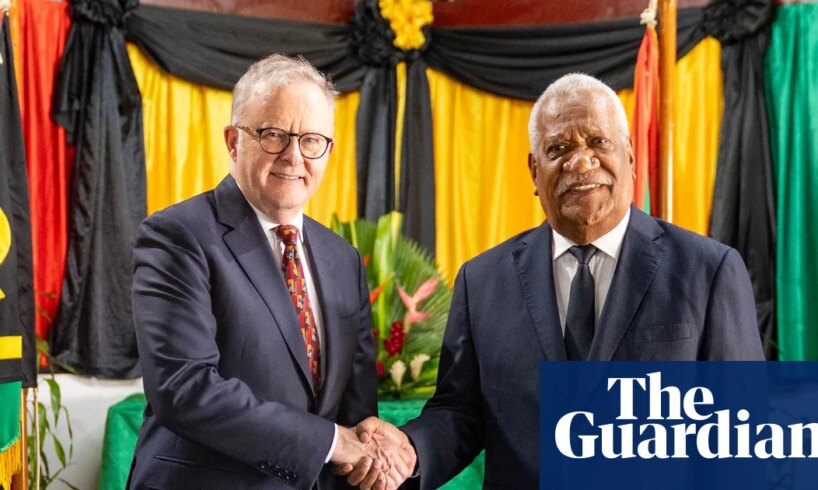
Vanuatu remains open to signing a wide-ranging deal with Australia but must assert its sovereignty and will not be subject to pressure or “bullying” from larger countries, the country’s internal affairs minister, Andrew Napuat, said.
Australia failed to seal the $500m Nakamal agreement in Port Vila last month amid concerns from Vanuatu that it would block other countries providing infrastructure funding. Weeks later, Vanuatu said it planned to sign a memorandum of understanding (MoU) to deepen policing cooperation with China.
While Napuat said the two deals were separate, the stalled Nakamal pact and Australia’s recent failure to sign a defence treaty with Papua New Guinea have dealt a blow to Canberra’s efforts to push back on Beijing’s influence in the Pacific.
In an interview with the Guardian, Napuat acknowledged Australia’s role as a major player in the Pacific region but stressed that “this big partner must also respect the wishes of smaller nations like Vanuatu”.
Napuat said Vanuatu must assert itself as a sovereign nation, no longer subject to external pressures or “bullying” by larger countries such as Australia.
“These days are over,” he said. “We want the agreement to genuinely represent what we envision for our people tomorrow. This is the primary reason why the Nakamal agreement has been delayed.”
Napuat did not provide details of Vanuatu’s specific concerns. But he said leaders were working to ensure “the agreement truly portrays what we believe is best for our people and not an indirect statement of neocolonialism which could negatively impact our people in the future”.
“The leaders are open and can sign the agreement as soon as possible,” he said.
A spokesperson for the Australian foreign affairs minister, Penny Wong, said Australia “firmly respects Vanuatu’s sovereignty”.
“As close partners with a shared vision of a peaceful, stable and prosperous Pacific, we welcomed the invitation from Vanuatu for a Nakamal agreement,” the spokesperson said.
“When we partner with our Pacific neighbours, we do so with utmost respect for their sovereignty and their sovereign processes.
“Pacific leaders have agreed that Pacific security is the shared responsibility of Pacific Islands Forum members, and Australia shares that view.”
Prof Joanne Wallis, the director of the security in the Pacific Islands research program at the University of Adelaide, said while Australia remained Vanuatu’s major security partner, getting the Nakamal agreement signed and ratified was “always a long shot”.
“It didn’t have widespread support at the political level, and Australia should have foreseen this failure given the quiet demise of the 2022 security agreement, which the Vanuatu government never ratified,” she said.
As negotiations with Australia on the agreement continue, Vanuatu has moved to deepen policing cooperation with China.
Napuat met with China’s minister of public security, Wang Xiaohong, in Beijing last month and said the two countries hoped to formalise an MoU. Napuat said any deal is separate from the Nakamal agreement and focuses specifically on cooperation in policing and law enforcement – not broader security arrangements.
China has supported the Vanuatu police force since 2014, providing training, equipment and infrastructure. The minister said an agreement with Beijing would bring “structure and transparency to a partnership that has been ongoing for over a decade but was never formalised like our MoUs with other countries”.
He noted Vanuatu has similar agreements in place with countries including Australia, New Zealand and the United Kingdom “to better coordinate and manage various areas of partnership in the policing sector with all partners”.
Wallis said Australia had a “longstanding anxiety about powers with potentially hostile interests establishing a foothold in its Pacific neighbours”.
She said policing assistance from China provided to countries including Vanuatu “could have negative domestic impacts”, such as “introducing authoritarian policing tactics or propping up potentially illegitimate governments”.
But Wallis noted Australia still did “exponentially more than any other country in the southern Pacific”.
“China is never going to step in to provide the comprehensive security support that Australia does,” she said.




